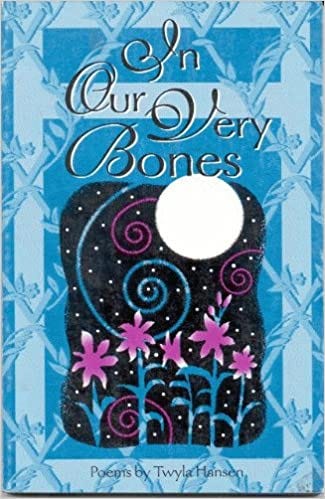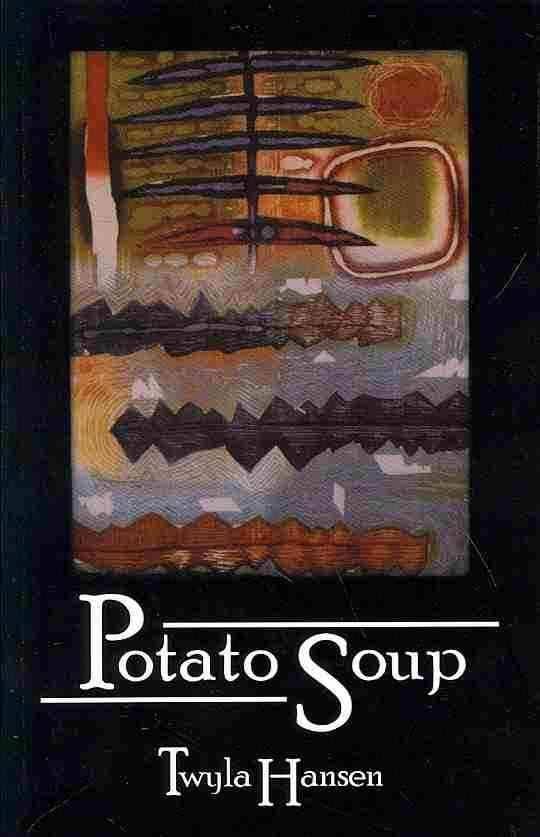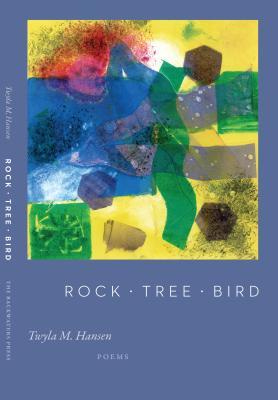Twyla M. Hansen was selected as Nebraska’s State Poet for 2013-2018. She co-directs the Poetry from the Plains website, and has conducted readings/ writing workshops through Humanities Nebraska since 1993. Her newest book, Rock • Tree • Bird, won the 2018 WILLA Literary Award and Nebraska Book Award. She has six previous books of poetry, including Potato Soup, which won the 2012 Nebraska Book Award and was selected as a Notable Nebraska 150 Book in 2017. Her writing is published in periodicals, anthologies, and websites, including Briar Cliff Review, Prairie Schooner, South Dakota Review, More in Time: A Tribute to Ted Kooser (2021 University of Nebraska Press), Nebraska Poetry: A Sesquicentennial Anthology 1867-2017 (2017 SFASU Press), Thinking Continental: Writing the Planet One Place at a Time (2016 University of Nebraska Press), Academy of American Poets, Poetry Foundation, Poetry Out Loud, and many more.
Randal Eldon Greene: Hello, Twyla Hansen.
I am a fellow Nebraskan. I lived in the eastern part of the state near Sioux City, Iowa where I currently reside. I admit that I grew up basically across from a farm field and cows, but my life was certainly not a farm life. Not truly rural even if when I was young the street was considered a rural route. Yet, I’ve always felt a touch of magic in this natural landscape and never entirely shook that sense. When I read your poetry, it breathes fresh life into that sense of magic – destruction, creation and the full range of sensations from the sweet summer smell of corn to the wet soil after a rainfall. Your poems often bring back that childhood sense of mine. It seems to me that much of your poetry not only seeks to express that regional magic, but that living the poet's life has kept those roots and sensations alive.
Twyla Hansen: I was born in Omaha and grew up in rural Burt County, Nebraska. There was a doctor in Lyons, the nearest town where we lived on a small farm six miles to the south and east, but the closest hospital was in Oakland where my three older brothers were born. My mother did not like the doctor in Lyons, and instead took us to Tekamah, the county seat, where we saw Dr. Allen. He was an old-school no-nonsense physician. I still have no idea why I was born in the Methodist Hospital in Omaha.
Our farm was small by today's standards. We raised cattle, hogs, and chickens, and milked cows. My father rotated crops to prevent insects and disease, and spread manure for soil fertility. This was before the widespread use of off-farm inputs like coated seeds, pesticides, and ammonium nitrates. And before Earl Butz, U.S. Secretary of Agriculture, admonished farmers to "get big, or get out."
My father was the youngest in his family and at sixteen had to quit school and take over farming when his father became sick with some kind of cancer. It haunted him his whole life that he never finished school. He had asthma as well as hay fever that made his life miserable for most of the year. I remember him taking injections that arrived in the mail from his doctor in Omaha, but he still had terrible coughing spells. In his mid-50s, after we had sold the farm and moved into town, he enrolled in a meat-cutter training school in Toledo, OH. When he returned, he found a job in Lincoln and so we pulled up roots and moved.
I was the youngest child, and started my junior year at Lincoln High School with more than 2,000 students after leaving a town of population less than 2,000. When I started writing in the early 1980s, I already had loads of material from my farm upbringing to write about. I only lived there until age 15, but that was where I formed my sensibilities, though I didn't realize it until much later. I couldn't wait to leave that farm, but I quickly learned that the farm will never leave me.
Randal Eldon Greene: How has your relationship to the land changed over time?
Twyla Hansen: All my books contain poems about the land, including the area where I grew up. The big shift in my writing about land came in Dirt Songs: A Plains Duet, more toward the attitude of an environmentalist, as in what we're doing today to screw up the land through agribusiness. Lack of enforcement of soil conservation practices – contour farming, terraces, grassed waterways, buffer strips, cover crops – have led to topsoil loss through wind and water erosion. Typical conventional farm cropping has a mere two-year rotation of corn and soybeans, whereas pre-agribiz farmers (and certified organic farmers today) practiced multi-year, multi-crop rotations for soil health by building soil with organic matter which increases water-holding capacity. Also, today's crop seeds often contain pesticides that kill off beneficial soil organisms and/or pollinators. I know a bit about this stuff because I returned to UNL in 2007 for a master's degree in agroecology (2007) and worked for a few years in organic farming certification. This awareness seeped into my newest book, Rock • Tree • Bird, as well as almost everything I've written since it was published in 2017.
Randal Eldon Greene: Do you still own that acre of urban wildlife habitat?
Twyla Hansen: Yes.
Randal Eldon Greene: One of your poems that I love is about building your own habitat. “Building a House” is concerned with how to create a new life out of old things, like "the front door off the Chism house." It's old and durable, but the old oak door also has to be stripped of its varnish. It reminds me, in a way, of how you create poems by taking an old memory, strip it down to the bare bones of experience, and then set that memory in its new home constructed of words and verse. This is my reader's experience of how it seems to me you create your poems. I'm interested in how you, as the author, experience writing your poetry.
Twyla Hansen: "The past is never dead. It's not even past." —William Faulkner
My father was a farmer and storyteller, and was the last of six children who lived (the first three died in infancy). From an early age I learned about my Denmark-born grandparents who immigrated to the US to farm. His father came first to Burt County to farm with his cousin. One story was of the two men living in a dugout along Bell Creek while they planted and tended crops, and spent the winter in Omaha. When they came back in the spring, the dugout was gone, washed out by flooding. Some time later, my grandfather returned to Denmark to marry my grandmother and bring her to America. They bought land in the same section as his cousin's that had been homesteaded, and moved a small house from a mile away, and combined it with the homesteader's house. It was unique with two staircases, but I grew up not knowing it was two houses until a few years ago. My grandmother loved flowers, and maintained a rock garden with perennials like tiger lily, iris, and columbine. There was a grape arbor and a lily pond, roses, and flowering shrubs such as lilac and snowball bush. I've often wondered about the people who once lived in those houses and busted sod. My father said when his parents went to town for supplies in their wagon, they just drove across the prairie because there were no roads.
There were many "rooms" on that small farm in which to grow up, indoors and out – outbuildings, groves, and hiding spots. As the youngest with three older brothers, I spent a considerable amount of time playing alone, making up stories and using my imagination. I inhabit all of those rooms even now, even though when I drive by what used to be our farm, the place has changed considerably. But that is time and life, and change is constant. To answer your question, I "write to taste life twice, in the moment and introspection." (Anais Nin.)
Randal Eldon Greene: That's beautiful. I see you collect quotes, which I think is a wonderful thing. For readers, much of our lives is built by the books we inhabit in our hours of leisure. What authors and books would you say have most powerfully influenced you?
Twyla Hansen: In no particular order, here are just a few:
American Primitive - Mary Oliver
My Antonia - Willa Cather
Giants in the Earth - O. E. Rolvaag
Silent Spring - Rachel Carson
Old Jules - Mari Sandoz
I Know Why the Caged Bird Sings - Maya Angelou
Black Elk Speaks - John Neihardt
The Unsettling of America - Wendell Berry
A Sand County Almanac - Aldo Leopold
Cottonwood County - William Kloefkorn and Ted Kooser
The Solace of Open Spaces - Gretel Ehrlich
Teodoro Luna's Two Kisses - Alberto Rios
Above the River - James Wright
She Had Some Horses - Joy Harjo
The Immense Journey - Loren Eiseley
Randal Eldon Greene: What an amazing list! Do you have any advice for young poets today?
Twyla Hansen: READ READ READ AND WRITE WRITE WRITE!
Reading is an essential part of writing, in my view. So much great writing is online at Poetry Foundation, American Academy of Writers, Writers Almanac, Poetry from the Plains, and many more.
Get in the habit of practicing writing every day. If you think of it as practice, it takes the pressure off of thinking it must be perfect. And you just might get lucky.
If you think of something when you're busy that might turn into a poem – an image, an overheard conversation, eating food from your childhood, etc., jot a note to yourself. Then, write about it as soon as you can.
Use word lists to jump-start your writing. Let words drive the poem rather than ideas. Go with the flow if your poem veers off into left field. That is the joy of discovery in creative writing.
Purchase Twyla’s books on Amazon:
© 2021
About the interviewer:
Randal Eldon Greene is the author of Descriptions of Heaven, a novella about a linguist, a lake monster, and the looming shadow of death. His typos are tweeted @AuthorGreene and his website is AuthorGreene.com









Twyla’s list of books is impressive. “The past is never dead.”